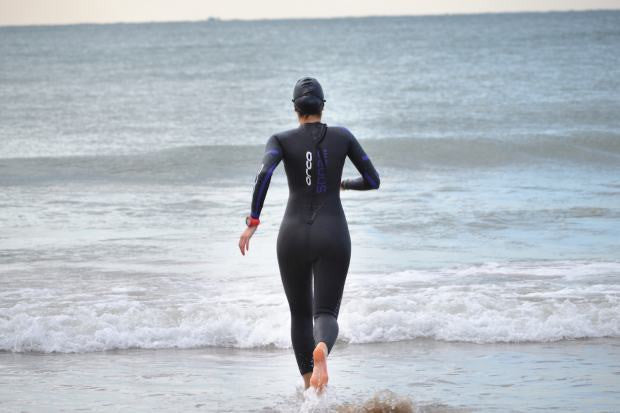
WHICH WETSUIT SHOULD I CHOOSE?
Share
There are more and more of us who are taking part in triathlons, and more and more people are taking an interest in this increasingly popular sport. One of the hardest questions that comes up when starting out, or when we're a little more experienced and want to change wetsuits is which one do I choose?

Orca ambassador, and fellow triathlete Miriam Garcia is going to try to help you with this question based on her experience.
A wetsuit is an accessory that can be either required, optional, or prohibited in triathlon depending on the distance and water conditions. But if it is allowed, its use must also be helpful in terms of our physical makeup and swimming ability.
It is important to stress that a wetsuit should not be chosen by it's price, but rather for it's features. The most expensive suit is not necessarily going to be the one that is best for us.
A wetsuit's main purpose is to protect us from the cold, but swimming in a wetsuit also provides other benefits in the water, affecting the way we swim and our performance - improving it noticeably if we are not great swimmers. This is why it's so important to choose the one that is best for us.
Two helpful questions to ask first would be: What is my ability as a swimmer? What are my sporting goals? Answering these questions truthfully will be key in making the right decision.
Swimming ability
Generally speaking, experienced swimmers need less buoyancy, as they have a good technique and are well adapted to the water. They will want a wetsuit that provides greater flexibility for greater freedom of movement so they can make the most of their abilities.
“Non-swimmers”, like me, who have started later and have a less developed technique but still feel comfortable in the water, opt for a wetsuit that gives buoyancy and stability, while at the same providing freedom of movement in the arm strokes and helping us glide through the water.
And for those who are more beginners and/or who find it difficult to maintain a good position in the water, it is recommended to opt for greater buoyancy in order to compensate for this. The reason being that buoyancy helps us into a better swimming position, so there is less drag, which means we swim through the water faster.
Sporting Goals
This is another aspect that must be considered when making our decision. Swimming 750m is not the same as swimming 2km or 3.8km. The longer the swimming time, the more likely you are to get tired.
Fatigue can reduce the force we exert when moving forward and may also change our position so that it is less efficient. If your goal is long distance, even though you are a fairly good swimmer, you may need extra buoyancy.
Failure to choose the right wetsuit may make us more tired, so we also need to keep in mind:
Size
The wetsuit must fit tightly, otherwise, a lot of water will get in. However you should never feel like you can't breathe - this is too tight! If it is the first time that you put on a wetsuit, you may feel strange or a little claustrophobic. Don't worry, this goes away. Work out your size carefully from the size chart or request help from someone with experience. Keep in mind that the neoprene will loosen up slightly when you get into the water too.

Training in a wetsuit
It is not a good idea to use a wetsuit in competition without having trained in it for a while first. As I mentioned, wetsuits change the way we swim, and it is very important to get our muscles and swimming technique used to this change first.
If you can't train in open water, wear one in the pool at the facilities where you train. Just be sure to rinse it thoroughly after every use with fresh water.
Models and ranges
We all know that prices are not exactly cheap, but these days we are very lucky to have a wide variety of models that meet the needs of every swimmer and their budget.
A wetsuit is more of an investment than an expense, taking into account its features and durability.
Orca divides it's wetsuits into three groups: Flexibility, Total Solution and Buoyancy. You can see which group you belong to by color below:

FLEXIBILITY: Ideal for those natural swimmers who have a good technique and position in the water and are looking for the most flexible wetsuit possible to complement their abilities and make them even faster.
TOTAL SOLUTION: Perfect for intermediate swimmers who do not have a poor technique, but who would still benefit from extra buoyancy, and at the same time want the sensation of freedom and flexibility with each stroke.
BUOYANCY: Designed for those swimmers who do not have a good position in the water and who need to kick a lot to keep from sinking. With different levels of buoyancy for men and women, since women have greater natural buoyancy.
What wetsuit do I wear?
I've been entering triathlons as an amateur for four years now. I'm not an excellent swimmer, and my technique is far from perfect, but I feel comfortable in the water and I tend to prefer medium distance triathlons.
With my abilities in mind, this year I looked for a balance between buoyancy to move faster in the water and freedom of movement in the shoulder area, in order to help my stroke. The Sonar has been my choice to enjoy many miles in the sea.
Find out more about Orca's wetsuits here.
